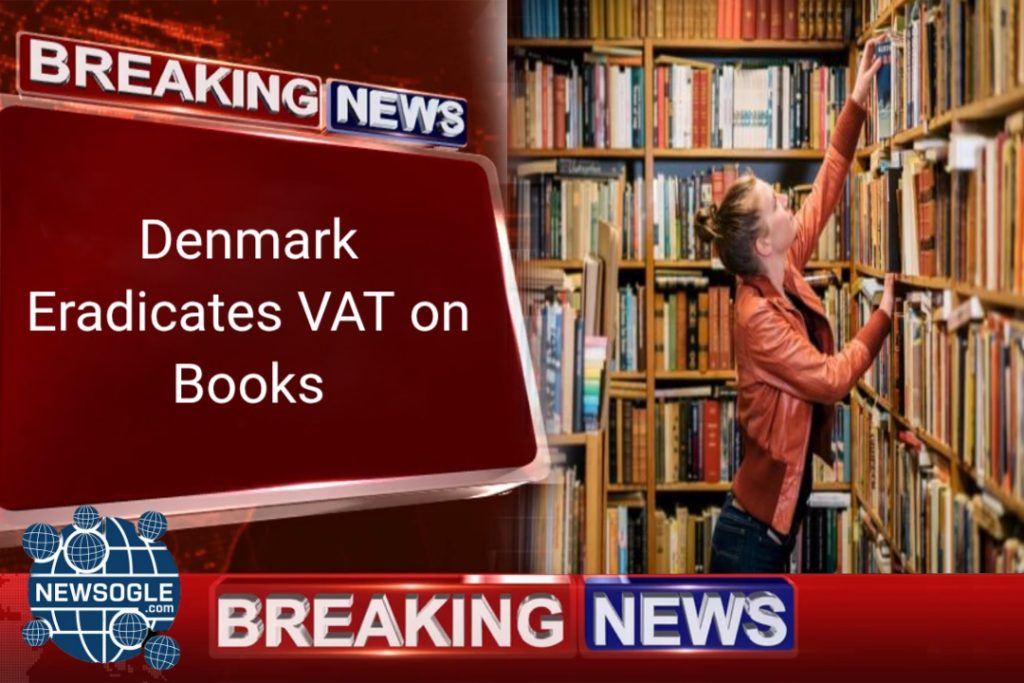
COPENHAGEN – In a landmark decision poised to reshape its cultural and educational landscape, the Danish government has announced the complete removal of its 25% Value Added Tax (VAT) on books. This radical policy shift, which makes Denmark one of the few nations in the European Union to implement a zero-tax rate on printed materials, is a direct response to a burgeoning national “reading crisis.” By making books significantly more affordable, authorities hope to reverse a worrying trend of declining literacy rates, particularly among the youth, and re-establish reading as a cornerstone of Danish society.
For years, Denmark has been grappling with a quiet but pervasive crisis. Despite its reputation for high quality of life and strong social welfare, recent studies and national surveys have revealed a concerning decline in the time Danes spend reading for pleasure. A 2023 report from the Danish Ministry of Culture highlighted that a decreasing number of children and adolescents are picking up books outside of schoolwork. The rise of digital entertainment, including social media, video streaming, and online gaming, has been identified as a primary competitor for attention, pushing the traditional act of reading to the periphery of daily life. This trend has not only concerned educators but has also alarmed policymakers who view reading as a fundamental skill for critical thinking, empathy, and informed citizenship.
The 25% VAT, one of the highest in Europe, was increasingly seen as a significant financial barrier, especially for families with limited incomes and for educational institutions with tight budgets. The price of a new book in Denmark often includes this hefty tax, making it a substantial expense compared to a monthly streaming subscription or the free content available online. The government’s new policy is a powerful signal that it considers books to be a necessity for intellectual and cultural health, not a luxury item. By reclassifying books to have a zero VAT, the government is essentially subsidizing the habit of reading for every citizen.
The policy will apply to both physical books and, in a critical nod to the digital age, e-books and audiobooks. This comprehensive approach ensures that the initiative remains relevant for all segments of the population, from traditional readers who prefer the feel of paper to a new generation of digital natives. The inclusion of e-books and audiobooks is particularly important, as these formats are rapidly gaining popularity and could be key to re-engaging younger readers. The Ministry of Finance has confirmed that the new tax rate will take effect at the start of the next fiscal quarter, and it has set up a task force to monitor prices in the market to ensure that the 25% tax reduction is genuinely passed on to consumers. This oversight is a crucial component of the plan, as there is a risk that publishers and retailers might absorb some of the tax cut without lowering the final price for the reader.
Hi there! I’m happy to help you with that. Here is a detailed news post about Denmark’s decision to remove the VAT on books.
Denmark Eradicates VAT on Books in a Bold Bid to Combat Reading Crisis
COPENHAGEN – In a landmark decision poised to reshape its cultural and educational landscape, the Danish government has announced the complete removal of its 25% Value Added Tax (VAT) on books. This radical policy shift, which makes Denmark one of the few nations in the European Union to implement a zero-tax rate on printed materials, is a direct response to a burgeoning national “reading crisis.” By making books significantly more affordable, authorities hope to reverse a worrying trend of declining literacy rates, particularly among the youth, and re-establish reading as a cornerstone of Danish society.
For years, Denmark has been grappling with a quiet but pervasive crisis. Despite its reputation for high quality of life and strong social welfare, recent studies and national surveys have revealed a concerning decline in the time Danes spend reading for pleasure. A 2023 report from the Danish Ministry of Culture highlighted that a decreasing number of children and adolescents are picking up books outside of schoolwork. The rise of digital entertainment, including social media, video streaming, and online gaming, has been identified as a primary competitor for attention, pushing the traditional act of reading to the periphery of daily life. This trend has not only concerned educators but has also alarmed policymakers who view reading as a fundamental skill for critical thinking, empathy, and informed citizenship.
The 25% VAT, one of the highest in Europe, was increasingly seen as a significant financial barrier, especially for families with limited incomes and for educational institutions with tight budgets. The price of a new book in Denmark often includes this hefty tax, making it a substantial expense compared to a monthly streaming subscription or the free content available online. The government’s new policy is a powerful signal that it considers books to be a necessity for intellectual and cultural health, not a luxury item. By reclassifying books to have a zero VAT, the government is essentially subsidizing the habit of reading for every citizen.
The policy will apply to both physical books and, in a critical nod to the digital age, e-books and audiobooks. This comprehensive approach ensures that the initiative remains relevant for all segments of the population, from traditional readers who prefer the feel of paper to a new generation of digital natives. The inclusion of e-books and audiobooks is particularly important, as these formats are rapidly gaining popularity and could be key to re-engaging younger readers. The Ministry of Finance has confirmed that the new tax rate will take effect at the start of the next fiscal quarter, and it has set up a task force to monitor prices in the market to ensure that the 25% tax reduction is genuinely passed on to consumers. This oversight is a crucial component of the plan, as there is a risk that publishers and retailers might absorb some of the tax cut without lowering the final price for the reader.
A Wave of Support from Stakeholders
The announcement has been met with widespread approval from various stakeholders across the country’s literary and educational sectors. Publishing houses, which have faced the dual challenge of rising production costs and stiff competition from other media, are cautiously optimistic. “This is a historic moment for the Danish book industry,” said Maria Larsen, the CEO of Gyldendal, one of Denmark’s largest publishing companies. “We have long advocated for this. It’s not just about our bottom line; it’s about making our work accessible to a wider audience. We are committed to passing on the full tax saving to our customers.” The Danish Publishers Association echoed this sentiment, noting that the move could stimulate a much-needed increase in sales, allowing them to invest more in new authors and diverse titles.
Authors and literary agents have also welcomed the change. For them, a more vibrant market could translate into more opportunities and better compensation. “Reading is a muscle that needs to be exercised,” commented bestselling novelist Jesper Kristensen. “This policy is like a national gym membership for the brain. By removing this barrier, the government is telling people that their intellectual and creative pursuits are valued. It’s a huge morale boost for everyone who works in the literary world.”
For Denmark’s libraries, which are often at the forefront of literacy promotion, the news is a welcome complement to their existing efforts. While libraries do not sell books, a general increase in reading interest and book ownership can drive more people to use library services. The Danish Library Association’s chairman, Søren Jensen, stated, “We see this as a perfect partnership. The government is making it easier to own books, and we are making it easier to borrow and discover them. Together, we can build a stronger culture of reading in every community.” Schools and educational bodies are also expected to benefit, as the lower cost of books could free up budget funds for other educational resources or allow for the purchase of a wider variety of texts for classroom and school library use.
Drawing on International Precedents
Denmark’s move is not an isolated experiment but part of a broader global trend. Several other European countries have long recognized the cultural and social value of books and have implemented similar policies. The United Kingdom, Ireland, and Norway, for instance, have zero-rated VAT on books for years. Portugal and Italy have also implemented significantly reduced VAT rates on books, often as low as 4-5%. In contrast, countries like Germany and France maintain a reduced VAT rate (7% and 5.5% respectively), while others, such as Hungary, apply the standard high rate. Denmark’s decision to go to zero places it in an elite category of nations that view books as a public good on par with essential food items or medicine.
The comparative data from these countries offers a positive outlook for Denmark. Studies in the UK and Ireland, for example, have consistently shown that the absence of VAT on books has helped keep prices lower, making them more competitive with other forms of entertainment. The UK’s Publishers Association has frequently pointed to the VAT zero-rating as a cornerstone of its thriving book market. Denmark is likely to see a similar effect, which, combined with its robust literary culture, could lead to a renaissance in reading habits.
Challenges and the Road Ahead
Despite the overwhelming optimism, the implementation of this policy is not without its challenges. The first major hurdle is ensuring that the price reduction is fully transferred to the consumer. The government’s monitoring task force will be crucial in this regard. Book prices are determined by a complex interplay of publisher costs, distributor margins, and retailer markups. While many in the industry have pledged transparency, market forces and the natural temptation to boost profits could lead to some price inflation that offsets the tax cut. The government has warned that it will take action if it finds evidence of price gouging.
A second challenge is tackling the root cause of the “reading crisis,” which is not just financial. The competition from screens and digital media is a cultural and behavioral issue that cannot be solved by a tax cut alone. While making books more affordable might encourage more purchases, it does not guarantee that people will choose to read them over scrolling through a social media feed. The policy is best seen as one part of a multi-faceted approach. To truly succeed, it must be combined with complementary initiatives from schools, libraries, and parents to promote reading as a valuable and enjoyable activity. The government has indicated that this tax cut is just the first step in a broader national literacy campaign.
Furthermore, there is a question about the impact on other cultural goods. Will this create pressure from other sectors, such as music or film, to also have their taxes reduced? The government has been clear that this decision is unique to books, which it considers to be a foundational element of public education and democratic discourse. However, the precedent has been set, and it could lead to future debates about the taxation of other cultural products.
Looking ahead, the success of this initiative will be measured not just in sales figures but in the long-term trends of literacy and reading habits. The government is investing in a future where books are not a forgotten medium but a vibrant and accessible part of daily life. By taking this bold step, Denmark is not just subsidizing an industry; it is investing in its people’s minds, their critical faculties, and their shared cultural heritage. The world will be watching to see if this powerful move can turn the tide on a global reading crisis and prove that in the age of digital distraction, the oldest form of media still has a vital role to play.






